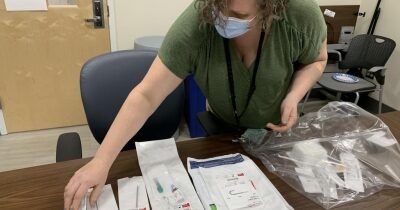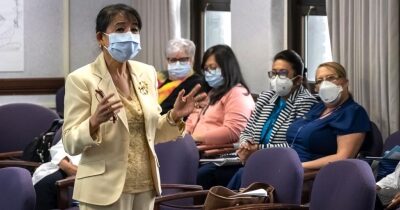The VA has expanded its health services to include access to abortion counseling and, in limited cases, abortion to veterans and VA beneficiaries, even when restricted by state laws.
Elnahal Is First Permanent VA Under Secretary for Health Since 2017
The Senate voted to confirm Shereef Elnahal, MD, MBA, as the next VA undersecretary for health, making him the first Senate-confirmed person in that role since 2017.
Sexual Harassment Reporting Structure Might Change at VA
Despite concerns from agency watchdogs that VA’s sexual harassment reporting process has a perceived conflict of interest, if not an actual one, the department has resisted changing it.
VA Partners With American Kidney Fund, Business to Tackle CKD
Several new partnerships are positioning the VA to offer more extensive services, educational material and testing for the one in six veterans estimated to have chronic kidney disease.
Minimally Invasive Surgery Is Safe, Feasible Option for Diverticulitis
Patients with right colon diverticulitis can consider minimally invasive surgery a safe, feasible treatment option, according to a recent study.
VA OIG: Lack of Oversight Found in DO’s Sexual Abuse at Beckley VAMC
This is just the latest finding by the OIG that places blame for a recent criminal case on lack of VA oversight.
Psychologist Colleen Richardson Makes Sure VA Properly Cares for Caregivers
During her four years of active duty with the Navy, Colleen Richardson, PsyD, saw the immediate effects of trauma first-hand. In 2008, as the first woman Operational Stress Control and Readiness Provider embedded with the 1st Marine Division’s Regimental Combat Team, the clinical psychologist provided mental health care to servicemembers on the front lines in Iraq.
Marijuana Laws Linked to Increasing Cannabis-Use Disorder in Veterans
As laws and attitudes about marijuana use have been relaxed over the past two decades, the substance has become widely regarded by society as innocuous.
COVID-19 Telehealth Changes Improve VA Treatment for Opioid-Use Disorder
Implementing new policies during the COVID-19 pandemic reduced barriers to telehealth delivery of buprenorphine treatment for opioid-use disorder for veterans seeking care, a new study reports.
Survey: Post-9/11 Veterans More Likely to Exercise, Eat Right Than Civilians
BOSTON — Recent U.S. veterans reported similar or better outcomes than nonveterans when it comes to their health, vocational, financial and social well-being. That is in contrast to some earlier cohorts who had served in the military and lagged behind civilians in some domains.
Legislators: VA’s Whistleblower Protection Office Is Falling Short
Bipartisan legislation currently being drafted in the House is attempting to clarify the role of VA’s Office of Whistleblower Protection (OAWP), an organization that has been fraught with challenges since it was established in 2017.
COVID-19 Could Be Especially Risky for Veterans With Sickle Cell Trait
The presence of sickle cell trait (SCT) should be considered an adverse prognostic factor for COVID-19, according to a new study.
VA Focuses on Issue of Widespread Food Insecurity Among Veterans
Prior to the COVID-19 pandemic, approximately 11% of veterans were living in a food-insecure household, and 5.3% lived in a household with very low food security, meaning that eating patterns were disrupted and food intake reduced.
Reforms Put Caregiver Assistance in Danger for Most Post 9/11 Veterans
In a case of unintended consequences, as many as 90% of post 9/11 veterans currently enrolled in the VA’s Program of Comprehensive Assistance for Family Caregivers (PCAFC) were in danger of being discharged due to an ongoing wave of eligibility reforms.
Pharmacogenomic Testing Had Positive Results for Major Depression Patients
Pharmacogenomic testing can help clinicians avoid prescribing antidepressant medications that might have undesirable outcomes.
GAO Report Spotlights Medical Supply Issues at VA Healthcare Facilities
Each report the Government Accountability Office (GAO) submits to VA detailing weaknesses in the department comes attached with recommendations for solving the problems.
VA Further Postpones Electronic Health Record Rollout to New Facilities
VA has postponed the rollout of its new electronic health record (EHR) system to new facilities, including to Boise, ID, where it had been scheduled to go live last month.
Ho Seeks to Reduce Barriers to Care—Inside and Outside VA
Michael Ho, MD, PhD, a staff cardiologist at VA Eastern Colorado Health Care, has spent much of his professional career studying how veterans access VA and the barriers that might stand in their way.
MHS Researchers Found Current Antibiotic Dosing Guidelines Adequate for Critically Ill Patients With Trauma, Burn
Critical illness caused by burn and sepsis doesn’t alter how the body processes piperacillin and tazobactam (pip-tazo), an antibiotic and beta-lactamase inhibitor drug combination
Cost of VA-Reimbursed Community Care Is Rising Dramatically
Between FY 2017 and FY 2021, VA spending on community care rose from $10.1 billion to $21.8 billion–a 116% increase that does not factor in the costs of administering the program. At the same time, VA spending on healthcare in its own facilities grew 32%.
Chronic Traumatic Encephalopathy Is Uncommon in Brains of Military Personnel
Military personnel exposed to attacks with high explosives frequently experience neuropsychiatric symptoms, including cognitive dysfunction, behavioral changes, mood disturbances and suicidality.
Severe Staffing Shortages Are Again Increasing at VA Medical Facilities
After years of improvements, severe staffing shortages are back on the rise at VA. According to a VA Office of the Inspector General (OIG) report released last month, fiscal year 2022 put an end to a three-year staffing improvement
New Legislation Gives VA Inspector General More Investigative Clout
Two pieces of new legislation would provide VA’s Office of the Inspector General with greater investigative power and employees with a better understanding of how OIG works and what their responsibilities are when asked for assistance by investigators.
VA Liquid Biopsy Study Aims to Screen 10,000 Veterans for Cancer
Veterans comprise nearly one-third of the participants in a major study evaluating a multi-cancer, early-detection blood test.
VA Makes Efforts to Respond to Healthcare Workers’ High Levels of Stress
As VA employees are reporting increasing levels of burnout, and the department is facing its highest turnover rate in decades, VA has tried to put systems in place to support staff mental and emotional health.
Concerns Raised Again About VA’s Widespread Cybersecurity Deficits
For the past four years, the annual Federal Information Security and Modernization Act (FISMA) audit has warned that the VA has lingering deficiencies across a wide range of cybersecurity areas, from agency wide security management programs to incident reporting and identity management.
Telemedicine Effective for Parenteral Chemotherapy Administration at VAMC
With patients in rural Nebraska who have trouble accessing the primary campus in Omaha, the VA Affairs Nebraska Western Iowa Health Care System (VA-NWIHCS) is using teleoncology and remote chemotherapy services to expand care to those veterans.
Senate Changes Spread Out PACT Act Implementation Over Years
When Honoring Our Promise to Address Comprehensive Toxics (PACT) Act passed the House in March, it was expected to be a very hard sell in the Senate.
Community Care Coordination Puts Strain on VA Staff, Finances
Since 2014, when Congress passed the Veterans Access Choice and Accountability (Choice) Act, the VA has been paying for U.S. veterans to receive increasing amounts of private sector, non-VA, care.
VA Hospitalizations Dropped Moderately After Legislation Allowing Outside Care
With the implementation of the Veterans’ Choice Act of 2014 (VCA), hospitalization within the VA healthcare system showed a modest decline.







